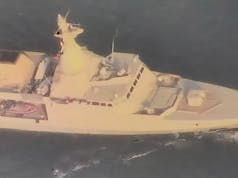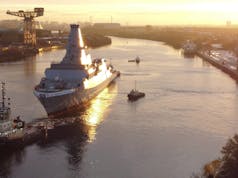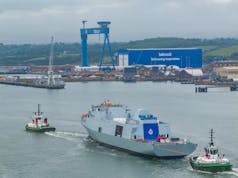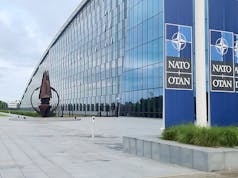I recently attended the First Sea Lord’s Sea Power Conference in London, where I had the privilege of engaging with various naval officers, from junior ranks to Captains and even the First Sea Lord himself.
Over a few insightful days, I gained a profound appreciation for the Royal Navy’s current and future status and why it remains a cornerstone of UK defence.
A prevailing theme at the conference was the Royal Navy’s unwavering commitment to operational readiness and modernisation despite its current challenges. The officers that I chatted with underscored the necessity of preparing for a wide range of operations, from conceptual missions to reactive platforms. This modernisation is about adding new ships and also about ensuring the fleet is equipped with cutting-edge technology to enhance both operational efficiency and combat readiness.
Personnel and Training Challenges
A significant concern among the officers I chatted with was the shortage of trained personnel, to use an example, particularly in specialised roles such as Dynamic Positioning operators onboard RFA Proteus. The crew exist and are in place for this but the rigorous training and certification process for such qualifications means that only a limited number are fully certified, potentially creating operational bottlenecks.
The RFA is addressing this by accelerating training programmes and streamlining recruitment processes to attract and retain talent. Additionally, efforts are being made to improve the efficiency of the application process, reducing bureaucratic hurdles that can deter potential recruits. Despite these challenges, the dedication and professionalism of the personnel I met at the conference and onboard shine through, they love what they do.
Technological Advancements and Fleet Capabilities
The fleet is aiming to be at the forefront of technological innovation, integrating remotely operated vehicles (ROVs) and other advanced underwater systems to enhance operational capabilities. New, novel technologies are crucial for handling various up-and-coming threats, including missile defence and swarm attacks. The officers I met described how future vessels are expected to be highly networked, leveraging information from space-based assets to maintain a strategic edge.
They also discussed the importance of platforms capable of deploying uncrewed systems to counteract swarm tactics, in which numerous small, autonomous, or semi-autonomous systems are used simultaneously to overwhelm a target.
Strategic Deterrence and Global Presence
The role of aircraft carriers in maintaining the Royal Navy’s global presence and projecting power was a central topic of discussion on a few occasions. Senior officers highlighted the strategic importance of a capable and flexible carrier strike group, especially in light of geopolitical threats from nations like Russia and China.
These carriers enable the Royal Navy to project power globally, deterring aggression and protecting national interests. This capability is certainly a matter of national pride, but it is also a crucial element of the UK’s ‘voice’ in the world. The ability to deploy significant combat power swiftly allows the UK to respond effectively to global crises and maintain international stability, as it can often deter further aggression.
Budget Constraints and Political Challenges
Budget constraints and defence spending allocation were also frequently discussed topics. Officers acknowledged the challenges of balancing investment in new technologies with maintaining and extending existing capabilities. Despite budgetary challenges, the Royal Navy continues to enhance its operational capabilities.

The Royal Navy’s ability to adapt and innovate within budgetary constraints is a testament to its resilience and strategic foresight but let’s not pretend it doesn’t need more resources to do what policymakers ask of it.
Positive Outlook and Future Prospects
Despite these challenges, the Royal Navy is poised for a bright future. The officers conveyed a sense of optimism and determination, highlighting numerous initiatives aimed at strengthening the Royal Navy’s capabilities. The introduction of new ships, advanced technologies, and improved training programmes reflect a proactive approach to addressing current and future challenges.
The commitment to innovation and excellence was palpable. Such commitment ensures the Senior Service remains a crucial component of the UK’s defence toolbox. Initiatives to enhance personnel recruitment and retention, for example, are already showing positive results.
The Importance of the Royal Navy
My time at the First Sea Lord’s Sea Power Conference provided an in-depth look at the Royal Navy’s current state and future direction. The dedication to modernisation, the emphasis on personnel readiness, and the focus on strategic deterrence all underscore the Royal Navy’s importance to UK defence.
I suppose the biggest task here is to convince policymakers and the public of this, after all, the Royal Navy and the RFA are often out of sight, defending this country from threats most are unaware of but they need the resources to do this – how to communicate this to people with little interest in the topic? I’m sure someone has the cure for sea blindness, answers on a postcard please.
The officers I spoke with conveyed a sense of urgency and determination, highlighting the need for continued investment and political support. The Royal Navy is not just a historic institution; the men and women who put an end to the colonial slave trade are today a dynamic organisation and an essential component of British national identity.
It was an interesting time at Lancaster House.
















A lot of talk but few if any contracts, is there an election soon?. His speech sounded more of a wish list a may be/might happen. Most of the ships he talked about are not even designed yet.
I lost faith in the word of the top brass a long time ago, empty words nothing confirmed. playing politics with defence.
Be very happy to be proved wrong,
Kier Starmer made 6 pledges today and defending the realm wasn’t one of them. Don’t think your going to be proved wrong anytime soon unfortunately.
Well Labour supporters do not like the incress in defence spending, no shock there. why is defence such hard thing to sort out, its the no1 job of government
I mean you said it yourself, their supporters aren’t interested. So why spend more money on it.
Actually, some of us are VERY interested.
Okay? But are there enough to matter.
I don’t agree, some of the unions are very pro defence and will lobby the leaderships accordingly. But that comes with its own baggage that it could see too much defence budget spent on over priced kit. But fundamentally there’s is some backing within the party for defence. Ironically unions back things like AUKUS (but won’t shout about it because its a Tory deal) but the membership of the party don’t support it.
the membership want it spent on NHS/Benefits and over sea Aid as normal,
This response highlights the difficulties the Labour Party faces. At a point they become electable there are still some dogmatic complainers who stick to an outdated and dangerous lack of world view
By then though they may have elected and that will as the older bolder know not go well in the long run.
13-15 frigates & destroyers is threadbare, hardly sea power. Disgracefully few for a permanent member of the UN security council, dangerously nominal to protect UK maritime trade, paltry contribution to NATO. We won’t return to the woefully inadequate 19 escort level until the early 2030s.
You act like this is shockingly lower than our European neighbours, it isn’t. Its equivalent to Frances escort fleet.
And that would be great if we were potentially facing France as an adversary. The requirement for a global Royal Navy however is to put up a reasonable defence against China, Russia and Iran. Letting your warship numbers decline to the current level is a pretty good sign that you’re probably doing something fundamentally wrong.
It’s pretty clear what’s going wrong. But politicians aren’t interested in any more than the bare minimum
It is shockingly low, exactly that & France has 21+ escorts so is considerably in better shape. We’re understregth for benign peace, a situation we’re far from with Russia & China very aggressive & China in a full scale arms race.
For all the HMG spin the RN is way short of the escort assets it needs.
France has 15 escorts, the Floreal class has no ASW ability or missile systems.
Theyll have 16 this or next year with the first FDI.
The La fayette class is also minimally armed and does not have significant ASW.
2 Horizon class-48 vls, slyver cells
8 SSM
8 Aquitaine class-32 vls, various lengths of slyver cell, 2 are AAW variants with a longer range radar
8 SSM
5 Lafayette class-8-12 missiles ready to fire mounted on turrets, very short range.
3 have 8 SSM
-1 FDI-16 slyver vls and 8 SSM
Didnt count guns, not super relevant to their combat ability
And then floreal class
6 of them, no vls, no sonar, no SSM
Nicely written George. keep up the good work.
Politicians and most of the media operate in soundbites. Get the right hook, and the media will print it. Unfortunately any real information is being drowned out by the government’s “golden age of shipbuilding” nonsense. You need a communications policy aimed at the government not by the government.
TBH most of the sound bites come from the press not the government. If you go on the gov.uk site there’s no sound bite headlines. Trouble is no one (except me 😀) actually looks at it.
I look at weds Gov UK that had the headline Golden age of Shipbuilding and posted it on UKDJ
The era of the soundbite is over! Or more likely the PM and DefSec don’t use .gov.uk to promulgate their soundbites. I think I’m suggesting MOD needs to get better at soundbites aimed at non-defence people, including government. They need to be catchy, accurate and capture an essential truth. Not an easy ask.
We need to get the basic punchy info out there if we want to inform and turn public opinion, especially among the younger generation. What does the military do? Photos of saving turtles on a South America beach just doesn’t cut it.
Seems from Georges report the RN know what they want & where they want to be. Lets hope the political class get the memo.
All I ever see is the word “Officers”. There is an old saying, ” Too many Chiefs, not enough Indians”. You don’t need pen pushing academics, you need people that can repair things and keep things running.
Also, the top brass needs to talk to those that are never seen, i. e. Technicians, see how they are treated. Ask why so many leave?
Okay, I get that the navy has great plans for the future and it needs to prepared for the moment, however at the moment morale in its current form is In its lowest ever point, my daughter is suffering a great deal with mental health issues caused by the “male ” dominated and uncaring Royal navy, she has been pushed to the point of no return, and indeed she isn’t the only female who feels like it, and it would be true to say that some “non” white male sailors are feeling the same, recruitment is at a all time low, and will continue to be so unless the navy get their act together and stamp down hard on thoses white males who are causing a bad name for those who really want take the navy a worthy career, building ships submarines and new weapons is great but you got to have the staff to use them so the powers to be need to get themselves back on track first and sort out how they treat their employees